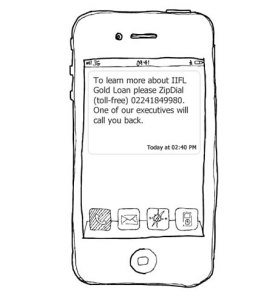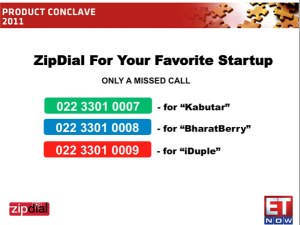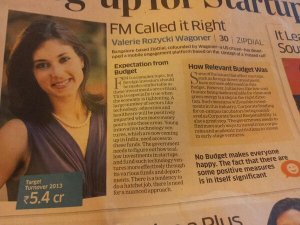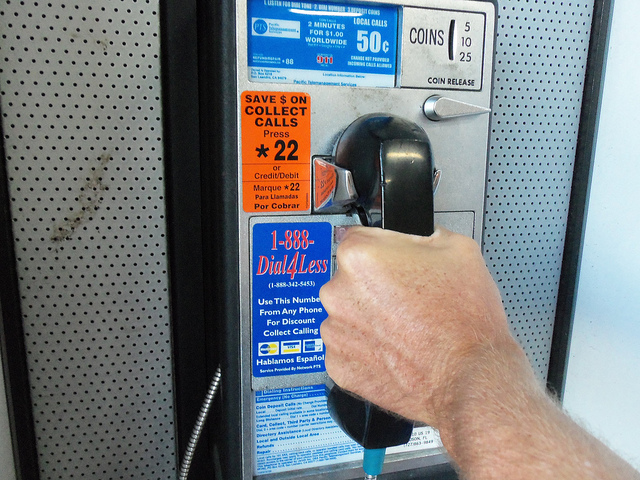During my trip to India, one of the most interesting companies that I met with was ZipDial. In a really cool home-turned-office in Bangalore, a team of brilliant people have turned a phenomenon that is unique to the country into a booming business. That phenomenon is missed calls.
While that might not sound like big business, once you realize why this is a prevalent behavior in India, it will make perfect sense. Basically, a lot of residents in the country use prepaid cellphones. Each connected call and sent text costs money; therefore the missed call was born. If you were to drop your friend off at their house and head home, you would call them and then hang up, as to signal that you’ve arrived safely. This way, nobody is charged for the call.
It’s kind of like the behavior of paging someone with “911” back in the day, as if to say “call me immediately.” While the pager behavior never turned into a business, the missed-call behavior most certainly has, and ZipDial owns the space.
The service that the company provides is provisioning a phone number that advertisers and companies like Disney and Gillette can plaster on billboards and newspaper ads, allowing people to call the number and disconnect without getting charged. After that, the person is sent a text message with communication about deals, coupons or any other messages that the business wants to convey. This is important because incoming text messages are free for prepaid cellphone users. The telecom companies in India love it, because it’s creating traffic that never existed before.
These companies can learn more about their “followers” by sending them surveys, which we’re told that many folks participate in. In many cases, these campaigns have outperformed those taking place on social networks like Facebook and Twitter.
The company has just announced reaching the milestone of 400 million missed calls, and I spoke with founder and CEO Valerie Wagoner to discuss how ZipDial has made waves in a market that didn’t exist before.
TC: Why missed calls? What was interesting to you that screamed opportunity?
 Wagoner: Growth in mobile adoption has been astonishing over the last five years or so, shooting up to more than 700 million users. Around the 2009-2010 time frame, there were more than 20 million new, first-time mobile users added to the network every month. That’s the population of Australia joining the network every four weeks!
Wagoner: Growth in mobile adoption has been astonishing over the last five years or so, shooting up to more than 700 million users. Around the 2009-2010 time frame, there were more than 20 million new, first-time mobile users added to the network every month. That’s the population of Australia joining the network every four weeks!
However, there was also a massive gap between innovations in the industry around data and smartphone apps and the actual capabilities of real users who today are still 96 percent feature phone users in India. While this will evolve as handset prices drop, and I am confident that smartphone adoption will exceed the predicted 25 percent penetration in the next three years, this still leaves an huge gap in the market between what people want and the tools they have.
While only 4 percent of users have smartphones and fewer than 50 percent even know how to send text messages, 100 percent of users love dialing “missed calls.” It’s an exceptionally prevalent peer-to-peer user behavior where users dial a friend’s number and then hang up on purpose in order to signal something such as “call me back” or “I’m thinking of you” or “I’ve arrived home safely.”
TC: What have you learned about Indian culture after launching the project that surprised you?
Wagoner: 1) Word-of-mouth is powerful, beyond what we had ever anticipated. Two examples:
a) Simply as a test we created a Cricket Scores service whereby a user could ZipDial (or dial and hang up, toll-free) to a particular number to get back an instant SMS with the latest cricket score. We did zero marketing other than me posting the ZipDial Cricket number on Facebook a couple times. Within a few months the service completely took off and there were millions of users zipdialing millions of times per day.
b) Upon realizing that Cricket had gone viral, we knew we needed to capture this social graph more intelligently. We built ZipDial Friend Referrals to incorporate into our customer campaigns, and it’s been amazing how well it has worked. The user experience starts with an ad in traditional media (e.g. print, TV, point of sale), and after ZipDialing to respond, the user is prompted to refer friends to the brand. In every case, there is a viral increase in reach of between 20-75 percent in responses (and therefore effectively an increase in ROI of 20-75 percent) due to friends inviting friends to participate in the campaign. It still amazes me that even though fewer than 10 percent of our users have smartphones or access to Internet, they are able to create these viral campaigns and build a social graph.
2) Willingness to pay among low-income consumers is much stronger than others would give credit. For example, take mobile payments. For users in India earning $100-200 per month, mobile payments is not about splitting a dinner bill with friends. A lady living in a slum or village who can save a $0.50 bus ride and 4 hours between travel and waiting in line to pay an electricity bill would gladly pay at least $0.50 fee for that payment transaction, something we more-connected users in the U.S. would refuse to pay. There is vibrant consumption happening even if it is at lower-value transactions, and there is strong willingness to pay for goods and services of value.
TC: Are you profitable? If not, when?
Wagoner: We could be profitable today, at two times our current run rate, at three times, etc. It is a question of strategy and how fast we want to grow. The last 12 months for us have been squarely focused on understanding our customer metrics like ARPU, acquisition cost, retention and customer lifetime value. On that foundation, we are turning up the dials to scale faster even if it means profitability is stretched out.
TC: Tell us about your favorite usage of the service by a client.
 Wagoner: While many customers are enjoying ZipDial for a more specific pain point like collecting customer feedback, my favorite use case is when customers embrace consumer loyalty more completely. The three customers most attuned to this use case are Gillette, Greenpeace and the Disney Channel who are all using ZipDial in the same way – ZipDial Followers to build ongoing consumer loyalty.
Wagoner: While many customers are enjoying ZipDial for a more specific pain point like collecting customer feedback, my favorite use case is when customers embrace consumer loyalty more completely. The three customers most attuned to this use case are Gillette, Greenpeace and the Disney Channel who are all using ZipDial in the same way – ZipDial Followers to build ongoing consumer loyalty.
Every touch point they have with a consumer in the “real world” carries a ZipDial number as a call to action. The engagement started by dialing the first ZipDial call to action number activates an application on the platform, and the engagement continues in a flow of activities. Users become ZipDial Followers and get updates and engagement, similar to being a Twitter or Facebook follower.
For example for these customers:
Gillette starts with print ads, TV ads, or placards of agents giving out sample razors in shopping centers. Users engage with activities like “hear actor Salman Khan’s special message about his new movie” or “pledge to support rededication of the Gateway of India to Indian soldiers” or calling women to ZipDial to answer surveys about whether they prefer a beard or clean-shaven face on their man.
Greenpeace in their PR or carried by agents who greet citizens on the street. Users ZipDial to pledge support for the various causes they support like “stop deforestation and save tigers,” “stop toxic dumping by corporations,” or “more strict regulations for food safety in India.”
Disney Channel in all of their programming, including both direct Disney engagement like “vote for your favorite Disney princess” or “spot Mickey and ZipDial as he pops up on the screen” as well as brand solutions for their advertisers like “answer a quiz competition for Horlicks.”
ZipDial followers recruit their friends to engage (as mentioned above regarding friend referrals). In that way, every “real world,” traditional media not only becomes interactive and sticky, but also viral.
Marketers then use ZipDial Analytics for their “real world” campaigns in the same way that they would use Google or Facebook Analytics for online performance and engagement. Here are some interesting metrics from these three customers:
Gillette has more than 2.4 million ZipDial users engaged compared to 1.63 million Facebook likes. Users who respond to Gillette ads invite an average of 2.8 friends to join Gillette’s ZipDial Followers, though interestingly, users who were recruited by a friend are even more likely to invite other friends at an average rate of 3.2 friends.
Greenpeace has over 1.4 million ZipDial users compared to 131,000 Facebook likes. Click-through or “dial-through” rates on updates to Greenpeace’s ZipDial Followers are extremely high at 21 percent, which is far above the typical 2-3 percent response rate they get on updates to non-followers. Greenpeace also has a very high rate of viral reach. Users who responded to Greenpeace promotions have recruited an additional 54 percent of users to follow Greenpeace.
Disney, in only their first month of using ZipDial, acquired more ZipDial users than their still only 281,000 Facebook users. Within only that first month, Disney also saw a very high active rate with an average of 8.1 engagements per user.
Not only do these advertisers drive more engagement, but this also directly translates to analytics on performance and ROI of their traditional media spends. ZipDial Analytics allows marketers to slice data across media channels, geography, user profiles, etc.
TC: Would missed calls ever work in the U.S.? Where else would it work?
 Regardless of what phone you are carrying, the simplest thing you could ever do is dial a number, especially when it takes a split second for only one ring. Therefore, when it comes to driving interaction with traditional media, zipdialing will inevitably drive more responses, even in the U.S.
Regardless of what phone you are carrying, the simplest thing you could ever do is dial a number, especially when it takes a split second for only one ring. Therefore, when it comes to driving interaction with traditional media, zipdialing will inevitably drive more responses, even in the U.S.
That said, the reason we are focused on expanding first within emerging markets is because of the huge market need. Markets like the U.S. have highly connected consumers and relatively massive amounts of data on consumer profiling and personalization. This fundamentally does not yet exist in India and emerging markets, and that is the ground the ZipDial is breaking.
———
 As I traveled the country, I asked people what they thought about ZipDial and the other opportunities that India has as a market. Wagoner had some pretty good ideas on what else can be done there:
As I traveled the country, I asked people what they thought about ZipDial and the other opportunities that India has as a market. Wagoner had some pretty good ideas on what else can be done there:
India has an abundance of labor, plus high demand and high willingness to pay for education, coupled with migration that clogs the crumbling infrastructure in cities where jobs are more abundant.
Given these dynamics and given the increasing connectedness of people across the country, Crowdsourcing and related business models have huge potential but will take inherently Indian forms. For example, Rural BPOs are a variation of an outsourcing or crowdsourcing model that is bound to succeed. The more jobs that can be created in further reaching areas, the more this lighten the burden on overly congested metropolitan areas. Women are also a fantastic source of high quality labor. While in lower income segments, girls are severely undereducated, the number of women graduating from college or higher education nearly equals men, including in engineering and sciences. However, the percentage of women working drops dramatically in the mid twenties after marriage and child birth. This is a ripe opportunity to enable crowdsourcing models to employ well-educated women in circumstances which suit their more traditional lifestyles.
Wagoner studied emerging markets in college and took a chance by moving to India after working at eBay as a Business and Product Manager for two years. It has clearly paid off. To date, ZipDial has raised money from Times Internet and 500 Startups, but from what I’ve heard, there is more funding on the way.
[Photo credit: Flickr]































Comment